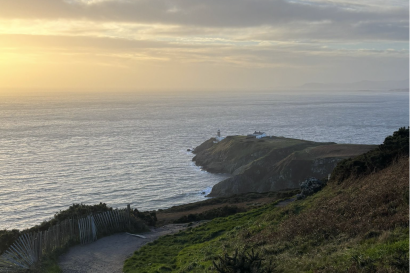"Only three percent of the population is fluent in Gaelic," our professor, Stephen, told us. "It's a controversial thing, whether or not kids should be required to learn it in school."
He goes on to tell us that, at any point in time, thirty languages around the world might be at risk of extinction. It's a new idea for a lot of us; extinction is more closely associated with animals than with cultural identities and language. Even he isn't fluent in Irish, after studying it all through his childhood.
"We were all thirteen, fourteen, you know? Asking when we would need to use it and all that." Stephen laughed. "We didn't know any girls who spoke it, so why would we want to?"
--
Dia Dhuit, Taylor is anim dom.
Or rather: "God be with you. Taylor is the name that I possess." This was the first lesson I learned in my Irish Literature course this past Monday morning, before delving into the history behind the language and its current state within the population. Gaelic, once the first language for most of the population, was very nearly eliminated when the British introduced a national school system and a map with anglicized names and labels for each city.
For example, Dublin was originally Dubh Linn, meaning "black pool." When Viking settlers landed in Ireland, Dubh Linn was their primary port. They named it for the black pool in the center. It's a pretty straightforward practice; there's logic and reason behind the name. "Dublin," though, doesn't necessarily translate back into anything. The significance of the name was lost in the translation.
That's the case for most of the locations around Ireland. According to Stephen, there are places that are trying to reclaim their roots; they black out the anglicized names on signs and speak to one another primarily in Gaelic. But these places aren't the majority.
In my Irish Literature course, we've started off with Translations, a play by Brian Friel examining the anglicization of Irish people in the early nineteenth century. We've spent our classes so far discussing the dehumanization and disenfranchisement that comes along with being forced into a new language. The conflict was created in the span of one generation, dividing children linguistically from their parents and effectively removing their ability to properly communicate what they know and what they've learned due to a distinct language barrier.
In my Irish History course with Regina, we've covered similar ground from a different angle; so far, our discussions have centered on the criminalization of the Catholic religion under British rule, and the divides existing even today between different religious sects of Ireland. Laws were put in place to prevent Catholics from owning land, educating their children, or entering into a profession; the dehumanization of Catholic practitioners closely mirrors the way that Gaelic speakers were ostracized.
Our lessons aren't all so dark and dreary, though; mixed in with the lessons on past strife and suffering are tea breaks, a sampling of different kinds of biscuits - cookies! - and even some musical education featuring acts like Rory Gallagher and James Vincent McMorrow. Despite everything that has happened in this country's past, there is a sense of cultural and national pride.
--
"Ah, you speak Gaelic?" I asked, leaning in close to hear the reply over the music.
My new friend nodded. "Yeah, I'm fluent! What do you know?"
"Not much. Uh, I think it's," I set my glass down and took a minute to remember what I'd learned that morning. "Dia Dhuit, ah, Taylor is anim dom?"
"Dia is Muire Dui! Kieran is anim dom!"
We shook hands, both smiling.

Taylor Haggerty
Hi! My name is Taylor Haggerty. I'm twenty years old and currently go to school in Bloomington, Indiana, for magazine design and poetry. This summer I'll be studying English and history in Dublin, Ireland!








